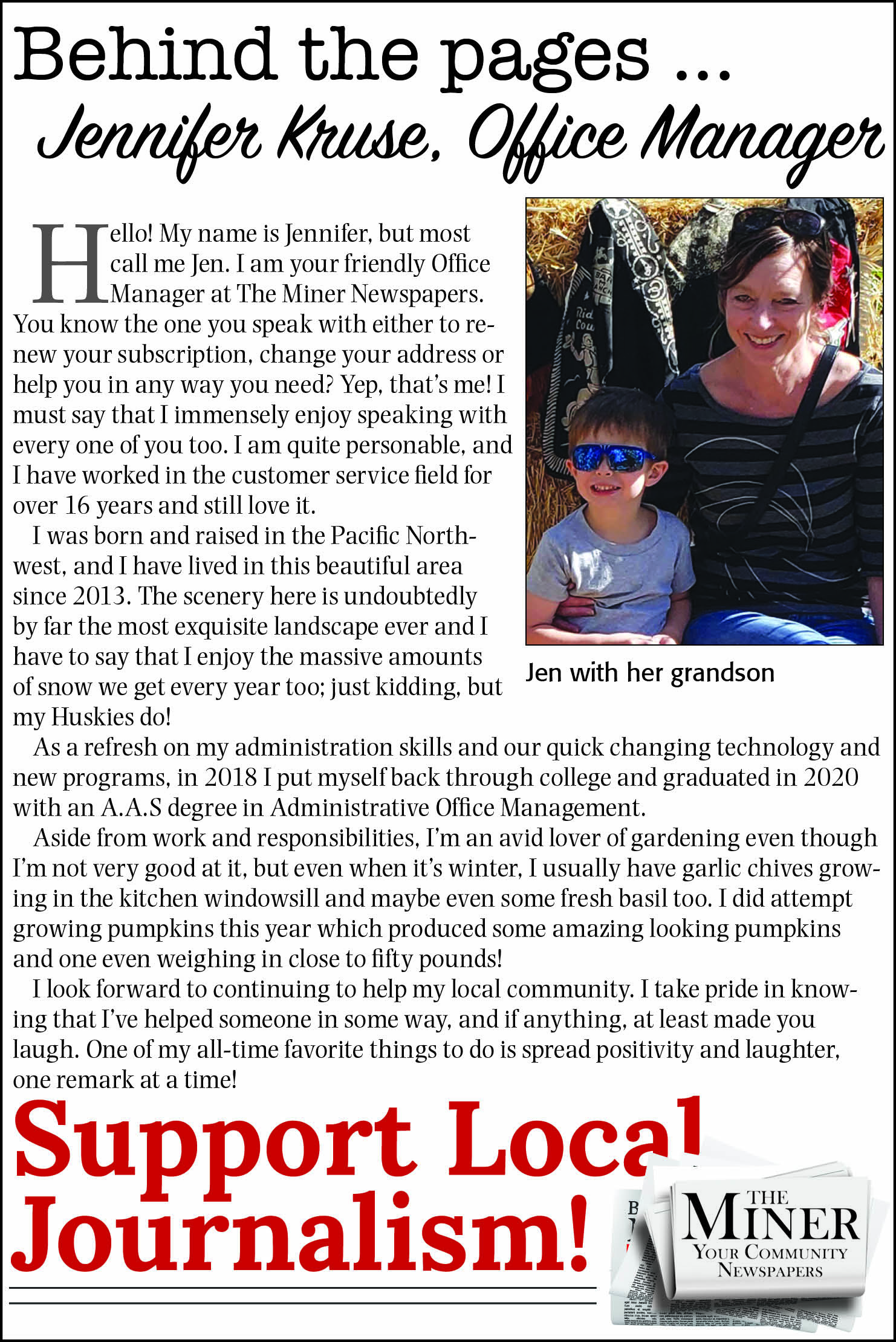GUEST OPINION
LORI LARSEN
STEVENS COUNTY AUDITOR
As county auditors in Washington State, we serve in the executive branch of local government and are responsible for administering elections in accordance with state and federal law. That includes elections for local, state, and federal offices.
The U.S. Constitution grants states the authority to conduct federal elections, and Congress sets certain minimum standards. Here in Washington, our Legislature has determined that vote-at-home is the official method of conducting elections—and that’s not just the law, it’s a system that works.
Vote-at-home in Washington didn’t happen overnight. It evolved in direct response to growing voter demand. Years ago, when absentee voting required a specific excuse, voters steadily requested more flexibility. Our Legislature responded—first by expanding absentee access, then by allowing counties to convert to vote-at-home elections where it made sense.
Clallam County was fully vote-at-home by 2002. In 2011, Washington became one of the first states in the nation to adopt vote-at-home as the statewide standard—a move built on decades of experience, careful planning, and voter trust.
Washington’s early and thoughtful implementation of vote-at-home helped pave the way for other states. During the COVID-19 pandemic, many states began using wide-spread mailed ballots for the first time. While some of those states are still refining their procedures, Washington’s policies, infrastructure, and checks and balances have been in place for years—offering a tested model for secure, accurate, and efficient election administration.
Vote-at-home works because it reflects the way people live. Voters can take their time, read through ballot measures and voter pamphlets, and return their ballots from home—or in person—when it’s convenient for them.
Ballots can be returned in person and into secure storage at the County Auditor’s Office, via any official drop box located throughout the county, or through the United States Postal Service. In addition, voters can sign up at VoteWA.gov to receive text notifications tracking their ballot’s journey—from issuance to acceptance.
It is well-documented that voter turnout is higher in vote-at-home states. Participation is easier and more deliberate, especially for those with demanding jobs, caregiving duties, limited mobility, or long travel distances to the nearest polling place. If Washington were to return to in-person-only voting, the very people who most benefit from expanded access would be the first to lose it.
We often hear from voters who wish results could be finalized on election night. We understand that desire—but elections are large, complex operations.
In our field, there’s a well-known principle: you can have two of the following—fast, accurate, or affordable— but not all three at once.
If speed were the top priority, we would need to dramatically expand staffing, technology, and overnight operations. Returning to polling-place voting would multiply costs even further. Staffing dozens of polling sites (or hundreds in larger counties), renting or preparing facilities, purchasing equipment, training workers, and providing oversight to ensure those duties are performed without error or fraud—all of it would be enormously expensive. And for what gain?
Not greater accuracy. Not better security. Just more cost, more complexity, and less access.
Washington has made a different choice—we prioritize accuracy and fiscal responsibility. Vote-athome allows us to serve all voters while using public funds efficiently and transparently. We believe that the taxpayers in our counties expect their dollars to be spent wisely—not on duplicating systems or reversing a model that already works.
Vote-at-home is also a system that is secure. Every ballot is tracked. Every envelope requires a voter signature, which is verified against the voter registration file before the ballot is processed, (not feasible to complete for ballots received late on election day).
And every election—without exception—is reconciled to account for every single envelope and ballot.
Counties must report how many ballots were issued, how many were returned, how many were counted or rejected, and why. This reconciliation process is fundamental to trust, and it is performed in every election in every jurisdiction.
We are proud of the work our offices do—and proud of our dedicated elections staff, whose professionalism, attention to detail, and commitment to transparency are at the heart of every successful election. The accuracy, integrity, and reliability of our vote-at-home system would not be possible without their expertise and care.
As election administrators, we are committed to upholding the law—no matter how it changes. That’s our duty, and we take it seriously. But we also believe that changing or eliminating Washington’s vote-athome model is not necessary, not efficient, and not more secure. It would impose significant cost, reduce accessibility, and dismantle a system that has earned the trust of millions of Washington voters.
Vote-at-home is not just the law in Washington— it’s well-established and secure practice. It reflects the lessons we’ve learned over decades of service. And it reflects the will of the voters we serve.
If you ever have questions about your ballot or your registration, please contact your County Auditor’s Office. We’re here to help.
This op-ed was inspired by a thoughtful inquiry from a Stevens County voter, curious about the origins, security, and integrity of Washington’s vote-at-home system. Pend Oreille County Auditor Marianne Nichols promptly volunteered to join Stevens County Auditor Lori Larsen in coauthoring the response. A near-final draft was shared with all Washington State County Auditors and the King County Director of Elections, inviting them to cosign and share it with their local media. We are proud to note that the piece is cosigned by an additional 23 elected elections professionals from across the state— underscoring the shared confidence in the transparency, access, and integrity of Washington’s voteathome system. Cosigners: Heidi Hunt, Adams County Auditor Darla McKay, Asotin County Auditor Skip Moore, Chelan County Auditor Shoona Riggs, Clallam County Auditor Greg Kimsey, Clark County Auditor Will Hutchens, Columbia County Auditor Thad Duvall, Douglas County Auditor Michele Jaderlund, Grant County Auditor Sheilah Crider, Island County Auditor Brenda Huntingford, Jefferson Auditor Julie Wise, King County Elections Director Paul Andrews, Kitsap County Auditor Heather Jobe, Klickitat County Auditor Chandra Schumacher, Lincoln County Auditor Linda Farmer, Pierce County Auditor Natasha Warmenhoven, San Juan County Auditor Sandy Perkins, Skagit County Auditor Garth Fell, Snohomish County Auditor Vicky Dalton, Spokane County Auditor Mary Hall, Thurston County Auditor Karen Martin, Walla Walla County Auditor Stacy Henthorn, Whatcom County Auditor Sandy Jamison, Whitman County Auditor
.png)













